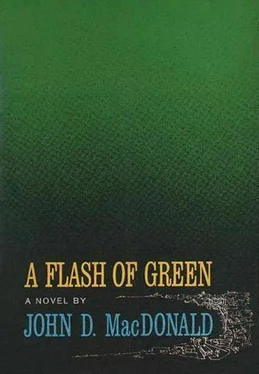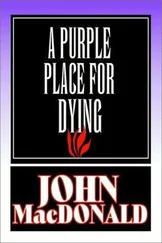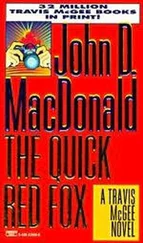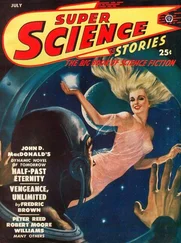He sat up and drank and settled back again. “I don’t know what to think.”
“Christ, it isn’t exactly what you’d call the chance of a lifetime. You know, though, you wouldn’t have to work for a while. You could get yourself sorted out.”
“I have to do something.”
“Yes, indeed you do. I’m neat. I make a lot of my clothes. I cook pretty well.”
“But terrible coffee.”
“I know. I know. So make your own.”
He sat up. “It isn’t every day I get propositioned.”
“It isn’t? I do. Oh, I’m sorry, hon. That’s the kind of joke I won’t make any more.”
“Mitch, I want to think about it.”
“I didn’t expect you to tear home and start packing.”
“But I do think I’ll go on home.”
“You could stay here. Please stay here, Jaimie.”
“I have to go. I couldn’t even tell you exactly why. Don’t be sore.”
“I’m not sore. It’s perfectly all right. Really. Just drive with care. I can’t afford to lose you too many times, my Jaimie.”
He stood just inside her doorway and kissed her. Barefoot, she seemed small. She tiptoed up snugly against him, her arm around his neck. Her solid weight moved him back against an angle of the wall by the door. His right hand, under her fleecy coat, traced the soft and heated planes of her back, down to the padded ledge of hip. At the end of the kiss he held her there, her lips at the base of his throat, her forehead pressing round and hard against his jaw. He looked beyond her and saw the palm fronds and the fat leaves of dwarf banana swaying violently in the inaudible wind.
“Goodnight,” she whispered and turned away from him. He let himself out. He had to cross the pool area to get to his car. He looked toward her big window from the far side of the pool, looked into the dark room. She was standing at the window. Only the pale short coat and the lesser pallor of her hair were visible.
Throughout the next week Jimmy Wing spent more time at his cottage than ever before. Mitchie stopped to see him a few times. At first she was confident and enthusiastic, but she became uncertain the more she became aware of his lethargy.
“So it was a dumb idea,” she said at last. “So it was a dream, Jaimie.”
“I didn’t say that.”
“You don’t have to say it, dear. Your enthusiasm speaks for itself.”
“I don’t know what I’m going to do. I haven’t thought it out.”
She stood up and went to the door. He followed her more slowly. She turned, with a sad, wise smile. “It’s one way to give me the message.”
“It isn’t like that, Mitch.”
“Isn’t it? Anyway, I’m off your back. You know where I am. Give me a ring sometime.”
“Sure,” he said too heartily. “I’ll do that.”
When the rackety sound of her little car was gone he searched himself for some feeling of relief, but, as during all the recent days, he felt nothing. He knew that it was implausible, and perhaps even dangerous, to have so little discernible reaction, but he could not summon up any sense of alarm.
The days were strange. Loella, the motel maid, had ceased coming over to clean the cottage, and it seemed too much effort to find out what had happened. The cottage grew increasingly cluttered. He had no routines, ate when he was hungry, slept often and heavily, sweating profusely in his sleep, dreaming of beasts and fleeing. He wondered how much money he had left in his account, but did not want to make the effort of reconciling his checkbook. He guessed it was about four hundred dollars.
He wrote to friends in far places, asking about the chance of a job. Usually the letters were too long, and he did not mail them. He tried to make a beginning on a half dozen ideas for magazine articles, but the prose seemed flat and artificial and he quickly lost interest.
The phone rang quite often that first week. He seldom answered it. Once, when he answered, a man offered him a free trip to Cape Coral and a free airplane ride over the new development, where hundreds of fine building lots were available, adjacent to the best fishing grounds on the west coast of Florida.
Another time a woman with a high, mad, whining voice chanted obscenities at him, terming him a Commie dupe.
He could not determine which of those two calls seemed more unreal.
He saved personal letters, unopened. One afternoon he decided to read them and looked all over the cottage for them and could not find them, and had to assume he had thrown them out accidentally.
He glanced at each day’s newspaper. The things he had always covered had been divided up among several people. When they weren’t by-lined, he could almost tell by the style who had written them. The paper constantly, stentoriously hailed the new era of prosperity which would enhance the area, courtesy of Palmland Development.
On his table was the carton Brian had dropped off, containing the junk from his desk drawers at the paper, a long accumulation. He did not open it.
Once, when he answered the phone, it was his sister Laura.
“I’ve been trying and trying to get you, Jimmy. I thought maybe you’d come here. I thought, being in so much trouble, you might come here.”
“I was going to. I just haven’t gotten around to it.”
“I wrote you a note for you to phone me. Didn’t you get it?”
“I’ll stop by and see you pretty soon, Sis.”
She lowered her voice. “Sid has been worse this week and I don’t feel right leaving him here alone, but I was going to come out there. I’ve been worried about you, Jimmy.”
“Everything is okay.”
“You lost your job, and nine out of every ten people in the county think you ought to be ridden out of here on a rail, so things must be real good for you. Real real good. What are you going to do?”
“I’m not sure yet.”
“Are you looking for a job?”
“I’ve got a couple of ideas.”
“Jimmy, you sound so kind of blah. Are you facing up to things? You’re the kind who always needs a push. You’ve got a wonderful education. You should get away from here. You know that, don’t you?”
“I guess so.”
“I don’t want to sound cruel, but there’s one thing I won’t have you doing. I won’t have you coming here and moving in on us, not unless you can pay your way. If you could, it would be a help, but I don’t see how you’re going to find any kind of a job around here. Jimmy, you come on into town and talk to me tonight.”
“I’ll be around to see you pretty soon.”
“We have to talk.”
“Sure, Sis. We’ll talk it all out.”
On Thursday, the third day of August, Brian and Nan came to the cottage at sunset. They had to sprint to the door through a hard rain that began to come down just as they had parked.
“You given up answering the phone?” Brian asked.
“Too many weird calls,” Jimmy explained.
“They should be dying out by now,” Brian said. “After all, they won.”
“ Look at this place!” Nan said, staring around. “If I can borrow a shovel and a wheelbarrow, Jimmy...”
“Don’t bother with it,” he said.
She gave him a questioning look. “I am going to bother with it. In fact, dear, it almost pleases me. You’ve always been such a Mister Neat, it made me insecure when you visited our cruddy little nest. I’m glad to see there’s a little slob in you. You guys go sit on the porch and watch the rain while I housewife this shambles.”
Brian and Jimmy sat on the rear porch. Brian said that at last he felt Borklund had stopped suspecting him of any complicity in what had now become famed as Wing’s Forthright Editorial Policy. Brian began telling him of the changes on the paper, the new assignments, the foul-ups on the things Jimmy had always covered. He stopped abruptly and said, “I get the strange idea you’re not tracking.”
Читать дальше










![Джон Макдональд - Wine of the Dreamers [= Planet of the Dreamers]](/books/430039/dzhon-makdonald-wine-of-the-dreamers-planet-of-thumb.webp)

